Sternohyoid muscle
The sternohyoid muscle is a thin, narrow muscle attaching the hyoid bone to the sternum.[1][2] It is one of the paired strap muscles of the infrahyoid muscles,[3] serving to depress the hyoid bone.[1][4] It is innervated by the ansa cervicalis.[2][5]
| Sternohyoid muscle | |
|---|---|
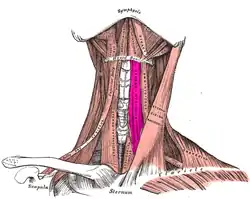 Muscles of neck. Sternohyoideus labeled at middle, just to the right of thyroid cartilage. | |
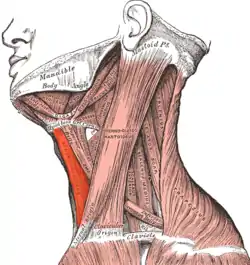 Muscles of the neck. Lateral view. Sternohyoid muscle labeled | |
| Details | |
| Origin | manubrium of sternum |
| Insertion | hyoid bone |
| Artery | superior thyroid artery |
| Nerve | C1-C3 by a branch of ansa cervicalis |
| Actions | depresses hyoid |
| Identifiers | |
| Latin | musculus sternohyoideus |
| TA98 | A04.2.04.002 |
| TA2 | 2168 |
| FMA | 13341 |
| Anatomical terms of muscle | |
Structure
The sternohyoid muscle arises from the posterior border of the medial end of the clavicle, the posterior sternoclavicular ligament, and the upper and posterior part of the manubrium of the sternum.[1][2] Passing upward and medially, it is inserted by short tendinous fibers into the lower border of the body of the hyoid bone.[1][2] It runs lateral to the trachea.[1]
Variations
Doubling; accessory slips (Cleidohyoideus); absence.
It sometimes presents, immediately above its origin, a transverse tendinous inscription.
Function
The sternohyoid muscle performs a number of functions:
Additional images
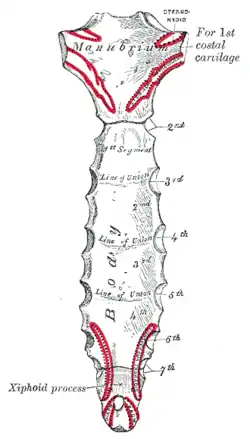 Posterior surface of sternum.
Posterior surface of sternum. Left clavicle. Inferior surface.
Left clavicle. Inferior surface.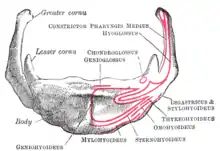 Hyoid bone. Anterior surface. Enlarged.
Hyoid bone. Anterior surface. Enlarged.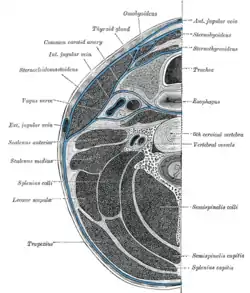 Section of the neck at about the level of the sixth cervical vertebra.
Section of the neck at about the level of the sixth cervical vertebra. Posterior surface of sternum and costal cartilages, showing Transversus thoracis.
Posterior surface of sternum and costal cartilages, showing Transversus thoracis.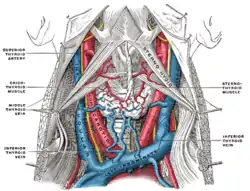 The fascia and middle thyroid veins. The veins here designated the inferior thyroid are called by Kocher the thyroidea ima.
The fascia and middle thyroid veins. The veins here designated the inferior thyroid are called by Kocher the thyroidea ima..JPG.webp) Sternohyoid muscle
Sternohyoid muscle Sternohyoid muscle
Sternohyoid muscle Sternohyoid muscle
Sternohyoid muscle Sternohyoid muscle - lateral view
Sternohyoid muscle - lateral view Sternohyoid muscle - right view
Sternohyoid muscle - right view Sternohyoid muscle
Sternohyoid muscle Muscles, nerves and arteries of neck.Deep dissection. Anterior view.
Muscles, nerves and arteries of neck.Deep dissection. Anterior view.
References
This article incorporates text in the public domain from page 393 of the 20th edition of Gray's Anatomy (1918)
- Kim, Jong Seung; Hong, Ki Hwan; Hong, Yong Tae; Han, Baek Hwa (2015-03-01). "Sternohyoid muscle syndrome". American Journal of Otolaryngology. 36 (2): 190–194. doi:10.1016/j.amjoto.2014.10.028. ISSN 0196-0709.
- Fessler, Richard G.; Kim, Daniel H. (2012-01-01), Quiñones-Hinojosa, Alfredo (ed.), "Chapter 191 - Surgical Approaches to the Cervicothoracic Junction", Schmidek and Sweet Operative Neurosurgical Techniques (Sixth Edition), Philadelphia: W.B. Saunders, pp. 2177–2191, doi:10.1016/b978-1-4160-6839-6.10191-1, ISBN 978-1-4160-6839-6, retrieved 2020-11-25
- Chokroverty, Sudhansu (2009-01-01), Chokroverty, Sudhansu (ed.), "Chapter 7 - Physiologic Changes in Sleep", Sleep Disorders Medicine (Third Edition), Philadelphia: W.B. Saunders, pp. 80–104, doi:10.1016/b978-0-7506-7584-0.00007-0, ISBN 978-0-7506-7584-0, retrieved 2020-11-25
- Derksen, Frederik J. (2006-01-01), Auer, Jörg A.; Stick, John A. (eds.), "Chapter 40 - Overview of Upper Airway Function", Equine Surgery (Third Edition), Saint Louis: W.B. Saunders, pp. 516–522, doi:10.1016/b1-41-600123-9/50042-5, ISBN 978-1-4160-0123-2, retrieved 2020-11-25
- McHanwell, Steve; Watson, Charles (2009-01-01), Watson, Charles; Paxinos, George; Kayalioglu, Gulgun (eds.), "Chapter 7 - Localization of Motoneurons in the Spinal Cord", The Spinal Cord, San Diego: Academic Press, pp. 94–114, doi:10.1016/b978-0-12-374247-6.50011-0, ISBN 978-0-12-374247-6, retrieved 2020-11-25
External links
- Anatomy photo:25:10-0103 at the SUNY Downstate Medical Center - "Nerves and Vessels of the Carotid triangle"
- PTCentral